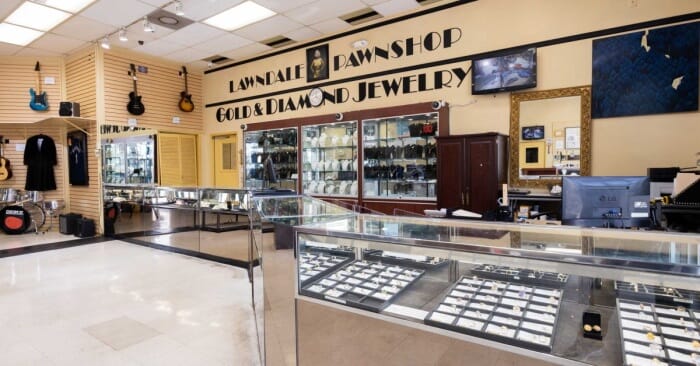There are many myths about how a pawn shop determines the value of your items. Contrary to what some people believe, pawn shops are not in the business of exploiting their customers. Like any other business, they want their customers to have a positive experience and visit them again.
So, how do pawn shops determine value?
The short answer is that the value of an item is based on what it can be sold for.
After reading this article you should have a good understanding of how pawn shops determine value. This will give you a better, more realistic idea of how much you can expect to be offered for your item(s).

It’s All About Market Value
Market value or OMV (Open Market Valuation) is the price at which an item would sell for in a competitive auction. It’s the price that a willing buyer is prepared to pay a willing seller.
A common misconception that many people are under is they think all items have an inherent or intrinsic value.
If you buy a pair of Jimmy Choo shoes for $1,000 does that mean you own a $1,000 pair of shoes? No, not unless the seller paid $1,000 for the shoes and you can sell it back to them or anyone else for $1,000.
Let’s assume you can only get $100 (after fees) for it on auction, then it’s “worth” $100.
What you paid for an item doesn’t really matter. Based on our above example, whether you got the shoes for free as a gift, paid $100 or $1,000 for it, it’s all irrelevant. If you’re only able to get $100 for it then that’s what your pair of shoes are worth.
Remember that a pawn shop is not a non-profit organization. They’re not going to pay you $100 today for an item they may get $100 for in a couple of months. Like any other business, they have to pay rent, utilities, employees, etc. and still show a profit.
The main advantage a pawn shop offers is that you can walk in with an item and walk out with cash in your pocket. You don’t have to wait days, weeks or even months to get cash for it.
How Pawn Shops Evaluate Jewelry
Most pawn shops specialize in jewelry, and since the evaluation of jewelry is often a contentious issue, let’s take a close look at it.
Jewelry Evaluations vs Appraisals
Some of the worst criticism pawn shops receive is how they evaluate jewelry, and the monetary difference between an evaluation and an appraisal. As you’ll see, it’s totally unjustified.
Jewelry evaluations are based on the market value or real-world value of an item.
An appraisal is mostly required for insurance purposes and is based on the approximate replacement cost of your jewelry.
The replacement cost of an item can differ dramatically from its market value.
Example
Let’s assume you walk into a jewelry store and buy a ring that’s marked down from $1,000 to $800, a 20% discount. If you ask the jeweler for an appraisal for insurance purposes, they will appraise it for $1,000 or more and not for what you paid for it.
Now let’s assume you don’t wear the ring and store it in your safe for a month. After a month, you return to the same jeweler with your receipt and appraisal certificate and ask them to buy the ring from you. What do you think will happen?
In the vast majority of cases the jeweler will tell you they don’t buy jewelry, even brand new jewelry, from the public. Should you be lucky enough to get an offer, it’s unlikely that it will be for more than $200. Why? Because that’s typically either slightly less or the same price that the jeweler paid for the ring.
If you decide to sell the ring on auction, you won’t even get close to selling it for the $800 “special” price you paid for it. And if you have been wearing the ring and it has small scratch marks or signs of wear and tear, you’ll get even less. Don’t be surprised if you can’t get more than $150 (after fees) for it on auction.
If you’ve ever wondered how jewelry stores can have 50% off, 60% off , and even 70% off sales several times a year and still make money, now you know.
The myth that it’s pawn shops that take advantage of consumers is just that, a myth. The sad truth is that consumers are being ripped off, but by retailers. This is often only exposed years later when they bring that overpriced item to a pawn shop to be evaluated.
But jewelry is made from precious metals!
A gold and diamond ring may look expensive, but that doesn’t necessarily mean it’s worth a lot.
Gold
It’s true that gold has an intrinsic value simply because it’s gold. But what impact does the price of gold have on that gold and diamond ring you bought for $1,000? Let’s find out.
Pure 24K (Karat) gold is traded in dollars per ounce, and there are 28.3495 grams in an ounce.
Since gold is a very soft metal, your wedding ring won’t be pure 24K gold. Other elements such as copper are added to it to give it strength. About 90% of wedding rings in the United States contain 14K gold. It’s only 58.3% pure gold.
Let’s assume the gold price per gram is $60 for 24K gold. For 14K it will be $34.98/g. That means if your ring, excluding diamonds or other stones, weighs 5g its gold content is worth $174.90.
Note that pawn shops can’t pay you the current market price.
First of all, the pawn shop has to make some money. Secondly, dealing with jewelry can be very risky. It can take a long time to sell, which ties up cash. In addition, the price of gold can drop at any moment.
In order to mitigate the risks, pawn shops and gold dealers will often send jewelry to be melted down, and factor those costs into their offer. A smelter typically charges up to 30% of the gold value to melt and purify the gold for further use.
Diamonds
What about diamonds? Unlike gold, diamonds have no intrinsic value.
The value of diamonds are based on the four C’s, namely Clarity, Color, Cut, and Carat (weight). Over the years, the diamond industry has manipulated the supply and demand of diamonds to increase prices. This eventually backfired on them and led to a slump in diamond prices.
Don’t expect to get even close to what you paid a jeweler for a diamond when you try to sell it.
Your fiancée may not want to hear it but diamonds are very overrated. They may be a girl’s best friend, but only until she tries to sell them.
There is one exception to the above. Large, flawless diamonds do have significantly more value than ordinary diamonds but these types of diamonds are very rare. It’s not something you would normally find in your average wedding or engagement ring.
How Do Pawn Shops Determine Value?
We’ve spent quite a bit of time looking at how jewelry is evaluated. But what about other items such as fine watches, musical instruments, antiques and collectables, computers, and DSLR cameras?
There are many factors that might influence the market value of an item.
It includes the condition of an item, whether it is popular and there’s a strong demand for it, or if it’s rare and sought after by collectors.
Pawn shops use a variety of methods to determine value. It includes the following:
Experience
The #1 method is through experience. Pawn shop dealers who have worked in the industry for a long time know how much certain items can be sold for. They also have a good idea of how long it will take to sell.
What Similar Items Have Sold for on eBay
Sites like eBay can be a useful tool to determine a ballpark value for an item. It’s based on what the item or comparable items in a similar condition have previously sold for.
Ad Platforms
Huge and popular online ad platforms such as Craigslist can provide pawn shops with a good idea on how much other sellers want for their items.
“Blue Book” Databases
Many years ago, pawn shops could buy physical “blue books” across various product categories that would give them a good idea of the value of an item.
Today there are online “blue books”. A good example is UsedPrice.com (called “The Orion Blue Book Online”) that they can consult.
Auction Results Databases
eBay can be a great source of information. But what about the thousands of other auction houses all over the world?
LiveAuctioneers is a free research tool for those who want to buy or sell. It has a database of over 29 million art, antique, jewelry, furniture, collectible, and fashion results that were auctioned off from thousands of global auction houses.
Third-Party Experts
Experts in a certain field are often consulted if a pawn shop doubts the authenticity of an item or needs help to determine its market value.
Pawn or Sell? Does It Make a Difference?
In general, there’s no rule that you’ll get more money for your item if you sell it or pawn it.
A pawn shop might give a better price to a customer that often pawns items and that they have a good relationship with. Contrary to popular belief, pawn shops want their customers to redeem the goods they’ve pawned. If they feel it’s unlikely a customer will redeem an item, they might offer less as it increases the risk that the pawn shop will have to sell the item.
In other cases, a pawn shop may offer you more for an item if you sell it instead of pawn it. This is typically the case where the pawn shop thinks it can quickly sell an item that would otherwise take up scarce storage space.
If you want to free up some cash, we suggest you sell the item. If you’re attached to an item but need a collateral loan and intend to collect the item once your loan has been paid off, pawn it.
For more information, read our expanded article on this topic, “Is It Better to Sell or Pawn at a Pawn Shop?“
Conclusion
We covered quite a lot of ground in this article, but it’s important for customers to know how pawn shops determine value and what they can expect.
The key takeaway is that what you paid for an item is largely irrelevant. The market value of an item is based on what it can be sold for. Pawn shops are fairly good at determining the value of items. However, that doesn’t mean they can pay you market value as the pawn shop also has to make money.
The main advantage that a pawn shop offers is that you can walk in with an item and walk out with cash in your pocket. You don’t have to wait days, weeks or even months to get cash for it.
Whether you want to sell or pawn your valuables, Maxferd is the place to go.
Call us at (800) 888-7296 or visit one of our five locations in San Francisco and Los Angeles to find out how we can assist you.

